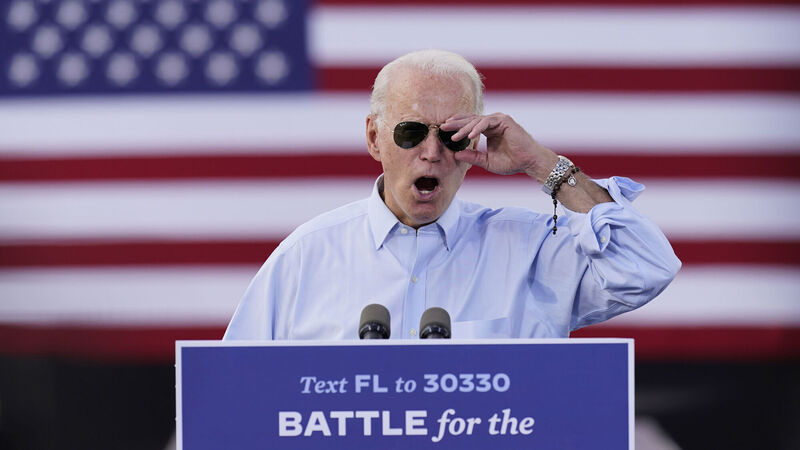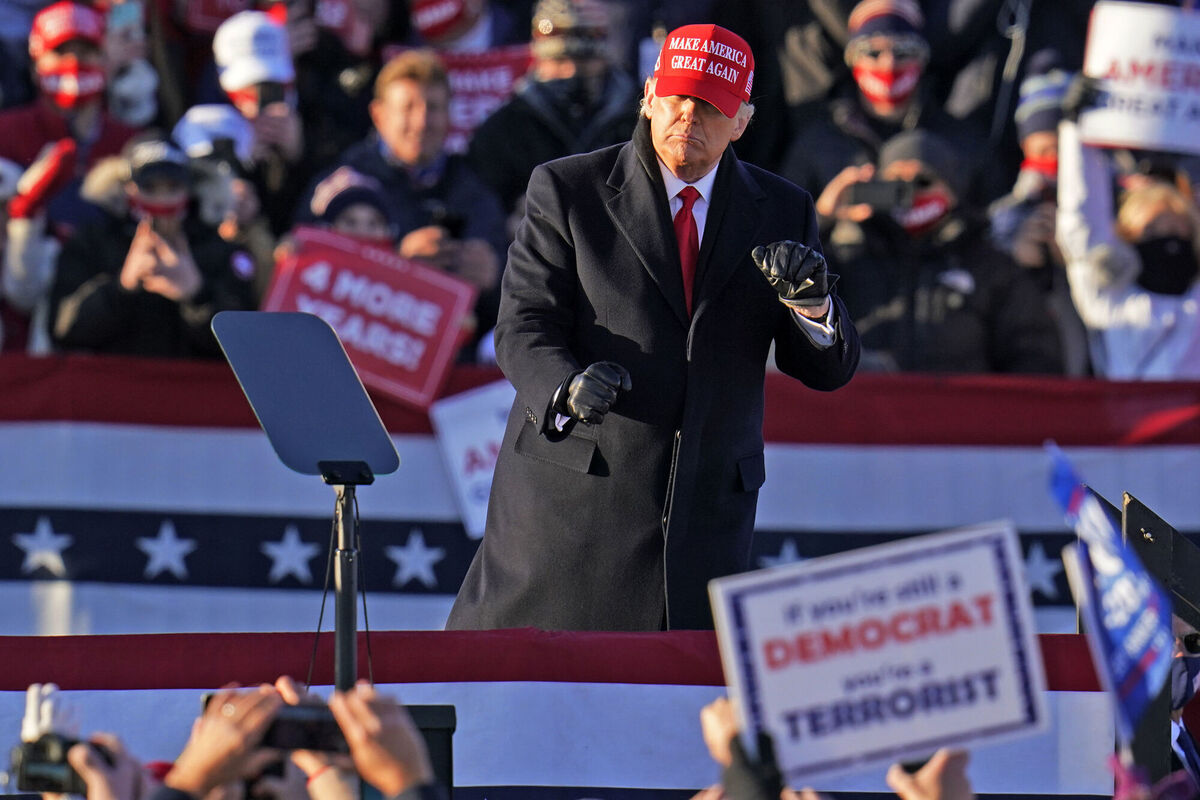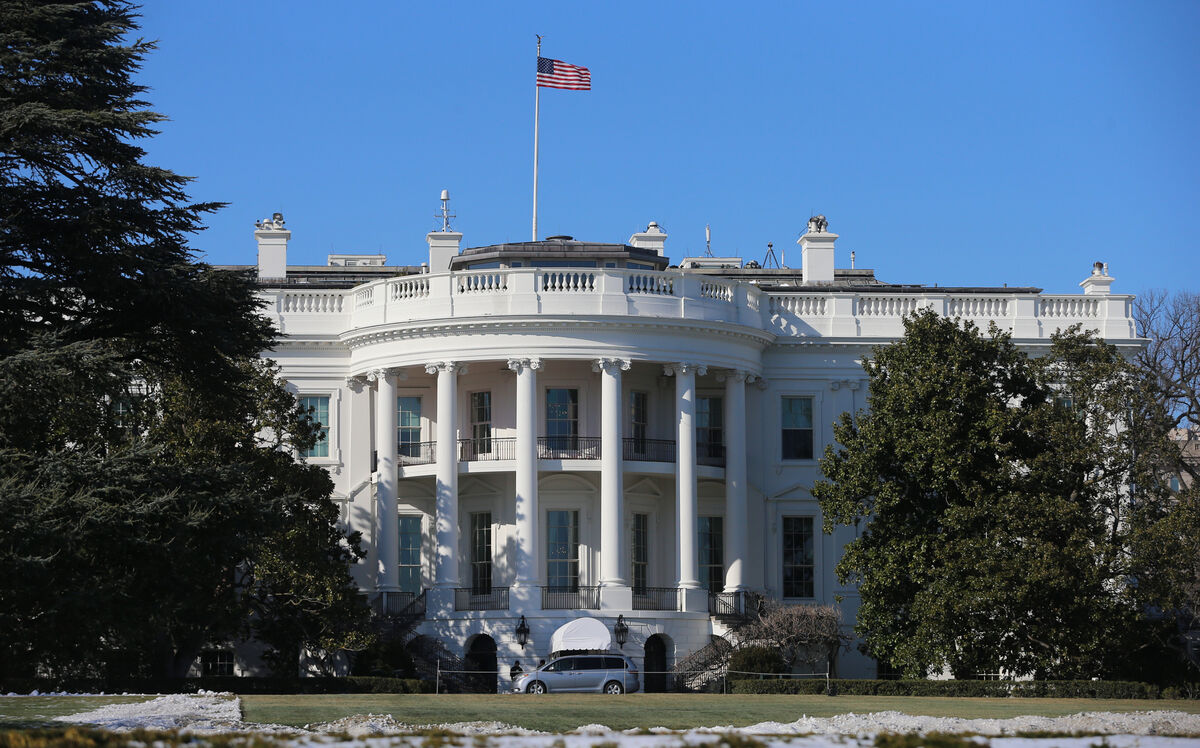Pádraig Hoare: US election result won’t move the needle much for Ireland

Democratic presidential candidate Joe Biden speaks at a drive-in rally at Broward College, Coconut Creek, Florida. Picture: Andrew Harnik/AP.
The powerful lobby that traversed the Atlantic Ocean beginning more than 170 years ago may not have as much influence as it once had, but Ireland’s relationship with the US remains strong.
How the little island country positioned betwixt the Land of the Free, a newly isolated UK, and traditional allies in Europe, fares in a new presidential administration remains to be seen.
Certainly, the sounds emanating from the power base of Joe Biden’s Democrats have been encouraging.
Boris Johnson’s left-hand-doesn’t-know-what-the-right-hand-is-doing approach to Brexit, coupled with Ireland’s anxiety over its nearest neighbour’s erratic behaviour, has been enough for Democratic speaker of the house, Nancy Pelosi, and party colleagues to issue a warning to Downing St — imperil the Good Friday Agreement, and the US will not negotiate a trade deal with Britain.
The message is clear — we got your back, Jack. So far, so good.
What the implications for a Biden victory are for Ireland’s thriving pharmaceutical and biopharma industries are less clear.
Biden has talked about encouraging American industries to come home, albeit in a less bludgeoning way that Donald Trump.
Trump’s corporate tax cut from 35% to 21% during his first year was enough to unsettle Irish business and political leaders, whose mood was not helped by the incumbent’s belligerence on trade, and tweets blasting business giants for perceived disloyalty to America.

Although they wouldn’t say so publicly, investment in Ireland was long-fingered by some of industry’s biggest players, as they adopted a wait-and-see approach to Trump’s bluster and belligerence.
They seem to have been assuaged in the years since. Massive investments and expansion have been announced in Irish operations in the interim, albeit disrupted by Covid-19.
Global giant Pfizer’s announcement this week that it will pump €300m into its Irish operations, including Ringaskiddy in Cork, will have boosted the confidence.
Expect more to follow if global firms finally feel unfettered by a Trump loss, and short-term fallout from his incendiary tweets lose all of their bite.
That’s not to say it a Biden win will herald a glorious future for foreign direct investment into Ireland.
Firms are feeling the pinch due to the pandemic, and investment will be careful and measured. Expect Biden’s administration to coax rather than bludgeon firms into continuing Trump’s so-called 'America First' economic policies, by staying home and investing in the American heartland.
Joe Biden is a Democrat after all, the traditional party of the working class, and he is never shy about playing up his blue-collar credentials, as a dreamy wide-eyed boy of Scranton, Pennsylvania, in the heart of the American 'rust belt'.
But Biden is a career pragmatist, and he will need to boost the coffers of an American treasury now trillions lighter in the pocket because of Covid-19 and Trump tax cuts that gave billions back to gleeful corporations that turned a blind eye and deaf ear to his rhetoric in exchange for share buybacks and beefier profits.
Biden will raise taxes, which means corporations will have to cough up more at home. Expect a push to increase the corporate tax rate from 21% to around 28% if he can get it through Congress.
If that happens, Ireland’s steadfast commitment to its 12.5% corporation tax, a unique selling-point rate that has helped a very savvy IDA continually attract investment into Ireland, will continue to seduce global firms.

What of Irish companies on the global stage?
Unlike the con job that was Taiwanese giant FoxConn’s announcement of a $10bn plant in America’s midwestern heartland of Wisconsin, which promised at least 13,000 jobs, and up to 50,000, for an eager population in 2017, and which delivered close to zero since Trump turned an imaginary sod in the same year, Irish firms have played their part for the US economy.
Despite being a tiny island nation on the fringes of western Europe, Irish companies like Kerry and Glanbia have excelled in states like Wisconsin and Michigan, propelling Ireland to ninth in the world as the largest contributors to foreign direct investment into the US.
According to the US Bureau of Economic Analysis, Ireland's FDI into the US stood at $235.7bn in 2019, with more than 900 Irish companies operating across all 50 states, employing 110,000. No small feat, and a record that is appreciated among local lawmakers.
Irish construction giants like CRH and other firms could finally benefit from either a Trump or Biden presidency.
Having waited patiently for Trump’s much-vaunted $1trn infrastructure plan, CRH will be hoping that a plan to rebuild America’s crumbling roads, highways, bridges, and airports finally gets the nod.
Trump’s ballyhooed plan has been mostly hot air, announcing Infrastructure Week over and over again where he talks a great game about the nation’s rebuilding, but little has been achieved.
A Democratic Congress, bolstered by victories in both the House of Representatives and the Senate along with the presidency, could finally get it going.
The $1trn plan has been a Democratic ambition for a long time, with Trump’s usurping of the position causing consternation among his own Republican party over its astronomical costs.
With an economy ravaged by Covid-19, Biden and the Democrats could see it as an easy victory — albeit with a hefty price tag — in the spirit of Franklin Delano Roosevelt’s New Deal for America, which put millions back to work after the Great Depression of the 1930s through massive government contracts.
Biden's win won’t move the needle a whole lot for Ireland during the next presidential term, but the blue victory should see normalcy, calmer markets, and cordial relations restored, with FDI in and out continuing to be a mainstay of both economies.





